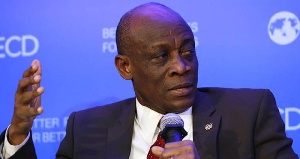The decision by the International Tribunal for the Law of the Sea (ITLOS) has brought certainty to the energy sector, Seth Terkper, former Finance Minister, has said.
The International Tribunal For The Law Of The Sea on Saturday, ruled that Ghana did not infringe on the territorial sovereignty of the Ivory Coast in granting oil concessions in the previously disputed area offshore Cape Three Points in the Western Region.
“The certainty in the energy sector from the ITLOS decision in boosting production. Exports and revenues also improve the success of Ghana’s new debt management and capital expenditure policies--substantially rooted in allocating oil revenues to manage our debt instead of channeling it into consumption through the recurrent budget,” Seth Terkper said.
Expressing his views about the ITLOS decision and it impact on the economy, Mr. Terkper told B&FT that the flows into the Sinking Fund and subsequent use of same to “buy-back” the sovereign bonds are based on capping the Stabilization Fund and channeling the annual excess flows into debt management, as required by the Petroleum Revenue Management Act (PRMA).
He added that by the end of 2016, Ghana had used slightly over US$330 million of its own oil revenues to redeem various debt, notably part of the 2007 Sovereign Bond that is due for redemption next month.
This, he said, has averted the payment of US$750 million to redeem or refinance the Bond—at a high interest rate or outright default.
“The combined Sinking Fund and ‘Buy-Back’ programme means that Ghana is gradually lowering the ‘roll-over’ risk associated with its long-standing ‘interest-only’ loan payment policy for bills and bonds. The nation is on course to replace them with gradual redemption of the principal element of these so-called ‘bullet’ loans,” Mr. Terkper said.
He explained that the Stabilization Fund itself was set-up under the PRMA as a conditional or rules-based savings account to provide a buffer for the budget by minimizing the adverse impact of deficits on the economy.
According to Mr. Terkper, in the 2015 and 2016 financial years, as crude oil prices fell, the country tapped into this Stabilisation Fund and utilized over US$250million to augment budget revenues, adding that: “No matter the level of sacrifice that went into postponing consumption, especially the build-up that saw the Fund accumulating over US$500 million between late 2011 and 2014 during the crude oil price boom, this outcome justifies the precautionary steps that nations take to save for a ‘rainy day’.
He stated that the additional oil flows that will arise from the ITLOS decision is welcome in continuing with these policies under the PRMA.
The significant policy measure linked to the PRMA is setting up of the Ghana Infrastructure Investment Fund (GIIF) as a Sovereign Wealth Fund (SWF), and this Mr. Terkper explained that the main flow which GIIF could leverage to borrow is a percentage of the PRMA oil revenues to the budget, known as the Annual Budget Funding Amount (ABFA), adding that the other source was the 2.5 percent portion of Value Added Tax (VAT) collection that has just been repealed in the 2017 budget.
He indicated that the rationale for GIIF, a technical institution, is that commercial projects financed by direct loans or guarantees to State-Owned Enterprises (SOEs) must be subject to a “self-financing” programme under the “smart-borrowing” rules, based on rigorous project evaluation processes.
“As envisaged, it will be the project, not taxpayers or the budget that will pay for the loans underlying all commercial projects. As the practice goes in the Emirates and other places, to qualify for SWF financing, the GIIF Act requires that a project must have a positive rate of return,” he said.
Commenting on the midstream and downstream investments benefits from the ITLOS decision, he stated that the case for value addition and diversification of the economy through the energy sector is strong. This is to avoid the fate of other primary products such as cocoa and minerals.
The decision not to flare gas led to the investments in pipelines and power plants including Ghana Gas Atuabo, VRA thermal, and Individual Power Producers (IPP) plants and are significant first steps in stabilizing power supply to businesses and households.
In this regard, the certainty that comes with the ITLOS decision bodes well for the World Bank PRG that was negotiated to underwrite the gas-to-power projects.
While the focus of the PRG was on Sankofa, gas from all the oil fields will flow through the same domestic pipelines—to be connected to the West Africa Power Pool (WAPP) through the recent adoption of the east-to-west (Tema-to-Takoradi) “reverse” gas flow programme.
Decision could be mutually beneficial
While Ghana savours the ITLOS decision and is undoubtedly proud of its legal team and foresight to go to the court to seek an amicable settlement, the decision is expected to be beneficial to both parties as it brings certainty in the award of oil contracts within the contested area.
Ghana and Cote d’Ivoire already share power under the West Africa Power Pool [WAPP]. Indeed, Ghana benefited a lot from Cote d’Ivoire during half a decade of power rationing, otherwise called “dumsor”. There is also a cordial relationship between the two states in the West African sub-region.
Business News of Friday, 29 September 2017
Source: thebftonline.com

















